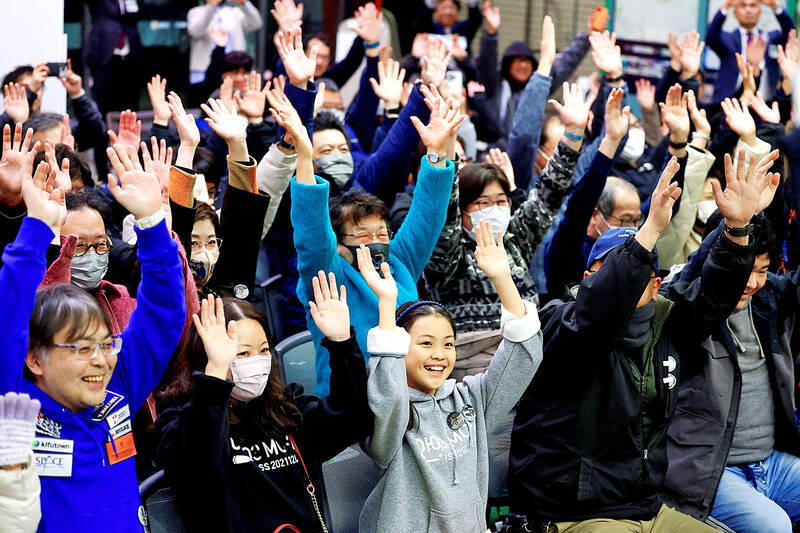Japan yesterday became the fifth nation to achieve a soft lunar landing, but said its “Moon Sniper” spacecraft was running out of power due to a solar battery problem.
After a nail-biting 20-minute descent, the Japan Aerospace Exploration Agency (JAXA) said its Smart Lander for Investigating Moon (SLIM) had touched down and communication had been established.
Without the solar cells functioning, Institute for Space and Astronautical Science director general Hitoshi Kuninaka said the craft — dubbed “Moon Sniper” for its precision technology — would only have power for “several hours.”

Photo: Reuters
SLIM is one of several new lunar missions launched by governments and private firms, 50 years after the first human moon landing.
Crash landings and communication failures are rife, and only four other countries have made it to the moon: the US, the Soviet Union, China and, most recently, India.
As mission control prioritized gathering data while they could, Kuninaka suggested that the batteries might work again once the angle of the sun changed.
“It’s possible that it is not facing in the originally planned direction,” he told an early-hours news conference.
“If the descent was not successful, it would have crashed at a very high speed. If that were the case, all functionality of the probe would be lost,” he said. “But data is being sent to Earth.”
Japanese Prime Minister Fumio Kishida called the landing “very welcome news,” but said he was aware that more “detailed analysis” on the solar cells was needed.
NASA Administrator Bill Nelson congratulated Japan in a message on X “on being the historic fifth country to land successfully on the Moon.”
JAXA said it hopes to analyze data acquired during the landing, which would help determine whether the craft landed within 100m of its intended spot.
SLIM was aiming for a crater where the moon’s mantle, the usually deep inner layer beneath its crust, is believed to be exposed on the surface.
Two probes detached successfully — one with a transmitter and another designed to trundle around the lunar surface beaming images to Earth, JAXA said.
Although the accuracy of the touchdown needs to be verified, Harvard-Smithsonian Center for Astrophysics astronomer Jonathan McDowell said that “the mission is a big success.”
Several things could have caused the solar panel problem, he said.
“A wire came loose, a wire was connected the wrong way, or the lander is upside down and can’t see the sun for some reason,” McDowell said.
The scientist added that “hopefully” JAXA had been able to download images from the landing, but an experiment to study the composition of moon rocks might be a lost cause.

SECURITY: As China is ‘reshaping’ Hong Kong’s population, Taiwan must raise the eligibility threshold for applications from Hong Kongers, Chiu Chui-cheng said When Hong Kong and Macau citizens apply for residency in Taiwan, it would be under a new category that includes a “national security observation period,” Mainland Affairs Council (MAC) Minister Chiu Chui-cheng (邱垂正) said yesterday. President William Lai (賴清德) on March 13 announced 17 strategies to counter China’s aggression toward Taiwan, including incorporating national security considerations into the review process for residency applications from Hong Kong and Macau citizens. The situation in Hong Kong is constantly changing, Chiu said to media yesterday on the sidelines of the Taipei Technology Run hosted by the Taipei Neihu Technology Park Development Association. With

CARROT AND STICK: While unrelenting in its military threats, China attracted nearly 40,000 Taiwanese to over 400 business events last year Nearly 40,000 Taiwanese last year joined industry events in China, such as conferences and trade fairs, supported by the Chinese government, a study showed yesterday, as Beijing ramps up a charm offensive toward Taipei alongside military pressure. China has long taken a carrot-and-stick approach to Taiwan, threatening it with the prospect of military action while reaching out to those it believes are amenable to Beijing’s point of view. Taiwanese security officials are wary of what they see as Beijing’s influence campaigns to sway public opinion after Taipei and Beijing gradually resumed travel links halted by the COVID-19 pandemic, but the scale of

A US Marine Corps regiment equipped with Naval Strike Missiles (NSM) is set to participate in the upcoming Balikatan 25 exercise in the Luzon Strait, marking the system’s first-ever deployment in the Philippines. US and Philippine officials have separately confirmed that the Navy Marine Expeditionary Ship Interdiction System (NMESIS) — the mobile launch platform for the Naval Strike Missile — would take part in the joint exercise. The missiles are being deployed to “a strategic first island chain chokepoint” in the waters between Taiwan proper and the Philippines, US-based Naval News reported. “The Luzon Strait and Bashi Channel represent a critical access

Pope Francis is be laid to rest on Saturday after lying in state for three days in St Peter’s Basilica, where the faithful are expected to flock to pay their respects to history’s first Latin American pontiff. The cardinals met yesterday in the Vatican’s synod hall to chart the next steps before a conclave begins to choose Francis’ successor, as condolences poured in from around the world. According to current norms, the conclave must begin between May 5 and 10. The cardinals set the funeral for Saturday at 10am in St Peter’s Square, to be celebrated by the dean of the College